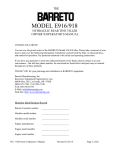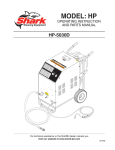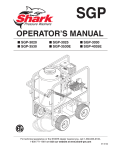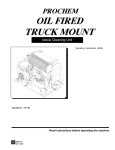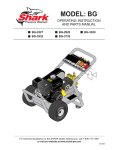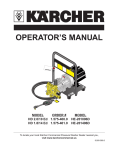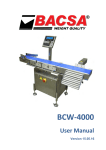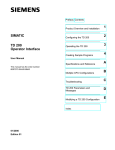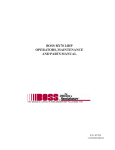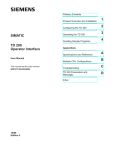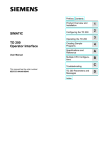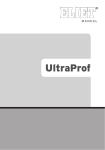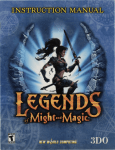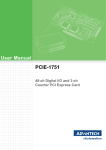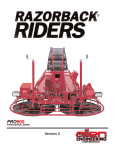Download J-2512 - General Pipe Cleaners
Transcript
JET SET TM TRAILER OPERATOR’S MANUAL ■ J-2512 General Wire Spring Co ■ USA ■ 1-412-771-6300 or 1-800-245-6200 Any alteration to equipment without prior written approval of the manufacturer will cancel any warranty or liability extended to the purchaser by manufacturer. For approval or assistance contact General Wire Spring Co. 8.941-185.0 / 97-6108 CONTENTS Introduction............................................................................................................................... 3 TRAILER INFORMATION Machine Safety......................................................................................................................... 3 Reporting Safety Defects.......................................................................................................... 3 Checklist, Before Your First Trip................................................................................................ 3 What to Check & How to Check............................................................................................ 3-5 Brakes.................................................................................................................................... 5-6 Towing Instruction..................................................................................................................... 6 Trailer Storage.......................................................................................................................... 6 Preventative Maintenance........................................................................................................ 7 Component Identification, Front and Rear View....................................................................... 8 SAFETY INFORMATION Warnings.............................................................................................................................. 10 Personal Safety.................................................................................................................... 10 Tool Use and Care.......................................................................................................... 10-11 Assembly and operation Pre-Operation Check........................................................................................................... 11 Set-Up Procedures.............................................................................................................. 11 Unhitching the Trailer........................................................................................................... 11 Pre-Operation Checklist....................................................................................................... 12 Operating Instructions.................................................................................................... 12-16 Maintenance................................................................................................................... 16-17 Trailer Exploded View ....................................................................................................... 18-19 Trailer Exploded View, Parts List . ..................................................................................... 20-21 Plumbing Assembly, Exploded View....................................................................................... 22 Plumbing Assembly, Parts List................................................................................................ 23 Power Platform, Exploded View.............................................................................................. 24 Power Platform, Exploded View Parts List.............................................................................. 25 Engine Control Assembly, Exploded View and Parts List....................................................... 26 Control Panel Assembly, Exploded View and Parts List......................................................... 27 Option D Exploded View and Parts List............................................................................. 28-29 Tool Box............................................................................................................................. 30-31 Wiring Diagram.................................................................................................................. 32-33 Pressure Washer Troubleshooting..................................................................................... 34-36 Warranty Model Number ______________________________ Serial Number ______________________________ Date of Purchase ____________________________ The model and serial VIN numbers will be found on a decal attached to the tongue of the trailer. You should record both serial number and date of purchase and keep in a safe place for future reference. General TRAILER MANUAL • #8.941-185.0 / 97-6108 • Rev. 2/08 trailer OPERATOR’S MANUAL introduction Thank you for purchasing a General Trailer Jet. This manual is designed to provide information to help you to understand, use and maintain the General J-2512 Typhoon trailer. To contact NHTSA, you may either call the Auto Safety Hotline toll-free at 1-800-424-9393 (or 366-0123 in Washington, DC area) or write to NHTSA, U.S. Department of Transportation, Washington, DC 20590. You can also obtain other information about motor vehicle safety from the Hotline. Owner/User Responsibility Trailer Registration Procedures The owner and/or user must have an understanding of the manufacturer’s operating instructions and warnings before using this equipment. Warning information should be emphasized and understood. If the operator is not fluent in English, the manufacturer’s instructions and warning shall be read to and discussed with the operator in the operator’s native language by the purchaser/ owner, making sure that the operator comprehends its contents. Owner and/or user must study and maintain for future reference the manufacturer’s instructions. This manual should be considered a permanent part of the equipment and should remain with it if unit is resold. When ordering parts, please specify model and serial number. Take the purchase invoice and the Certificate of Origin for that particular trailer to your local licensing authority. The name of this agency varies by local — Registrar of Motor Vehicles, Department of Motor Vehicles (DMV), Bureau of Motor Vehicles to list a few. In rare instances the agency will want to inspect the trailer. Do not delay, as there is sometimes a one-time sales tax collected beyond fees and time limits apply. Contact General's Customer Service at 1-800-245-6200 or 412-771-6300 from 8:00 am to 5:00 pm. Trailer Information Machine Safety WARNING: To reduce the risk of injury, read operating instructions carefully before using. 1. Read the owner’s manual thoroughly. Failure to follow instructions could cause malread operator’s function of the unit and result manual thoroughly in death, serious bodily injury prior to use. and/or property damage. 2. The best insurance against an accident is precaution and knowledge of this equipment. WARNING Reporting Safety Defects If you believe that your vehicle has a defect which could cause a crash or could cause injury or death, you should immediately inform the National Highway Traffic Safety Administration (NHTSA) in addition to notifying General. If NHTSA receives similar complaints, it may open an investigation, and if it finds that a safety defect exists in a group of vehicles, it may order a recall and remedy campaign. However, NHTSA cannot become involved in individual problems between you, your dealer or General. checklist Before Your First Trip ❑ Tire Pressure and Tire Condition ❑ Wheel Lugs* ❑ Bearing Lube and Tightness ❑ Burnish Brakes (See page 6) ❑ Brakes/Brake Controllers ❑ Breakaway Battery Charge ❑ Hitch ❑ Safety Chains ❑ 12V Running Lights ❑ Distribution and Security ❑ All Jacks “Up” in Travel Position * Check lug nuts for tightness before initial trip, at 10 miles, 25 miles and 50 miles. Recheck every 3 months or 3000 miles. Your dealer, in all probability, checked each of these points before you took delivery. However, these are key things you should recheck before taking your trailer on the road for the first time. What to Check and how to check Tire Pressure Proper air pressure for your tires is printed on the sidewall. Check pressure while tires are cold. Do not raise or lower pressure to meet load. Pressure other than recommended pressure will lead to excessive tire wear or tire failure. Balancing recommended. Preferred balancing General TRAILER MANUAL • #8.941-185.0 / 97-6108 • Rev. 2/08 trailer OPERATOR’S MANUAL method is to center off of stud holes, since 13" through 16.5" wheels are not hub piloted. Wheels Check wheels for hole elongation or “out of round”. This condition can be caused by lug nuts not being tight or being too tight. Trailer wheels can be damaged by chuck holes or curb jumping. You may not be aware of the road shock to the wheels without periodic checks. Replace any wheel that is bent. Replace any wheel if you see elongation of the bolt holes. Wheel Lugs Wheel lug nuts must be tightened with a torque wrench. Refer to the chart below for proper torque 1 1. Start all bolts or nuts by hand to prevent cross threading. 3 2. Tighten bolts or nuts following 4 sequence at right. 3. The tightening of the fasten2 5 ers should be done in stages. Following the recommended sequence, tighten fasteners per wheel torque chart below. 4. Wheel nuts/bolts should be torqued before first road use and after each wheel removal. Check and retorque after the first 10 miles, 25 miles and again at 50 miles. Check periodically thereafter. Wheel Torque Requirements torque sequence Wheel Size 1st Stage 2nd Stage 3rd Stage 14" 20 - 25 50 - 60 90 - 120 Tires Before mounting tires onto wheels make certain that the rim size and contour is approved for the tire as shown in the Tire and Rim Association Yearbook or the tire manufacturer’s catalog. Also make sure the tire will carry the rated load. If the load is not equal on all tires due to trailer weight distribution, use the tire rated for the heaviest wheel position. Note: The capacity rating molded into the sidewall of the tire is not always the proper rating for the tire if used in a trailer application. Use the following guideline: 1. LT and ST tires: use the capacity rating molded into the tire. 2. Passenger Car Tires: Use the capacity rating molded into the tire sidewall divided by 1.10. Use tire mounting procedures as outlined by the Rubber Manufacturer’s Association or the tire manufacturers. Tire inflation pressure is the most important factor in tire life. Inflation pressure should be as recommended by the manufacturer for the load. Pressure should be checked cold before operation. Do not bleed air from tires when they are hot. Check inflation pressure weekly during use to insure the maximum tire life and tread wear. The following tire wear diagnostic chart will help you pinpoint the causes and solutions of tire wear problems. Note: Tire wear should be checked frequently because once a wear pattern becomes firmly established in a tire it is difficult to stop, even if the underlying cause is corrected. Center Wear Adjust pressure to Over Inflation particular load per tire catalog. Edge Wear Under Inflation Adjust pressure to particular load per tire catalog. Side Wear Loss of camber or overloading Make sure load doesn't exceed axle rating. Align at alignment shop. Toe Wear Incorrect toe-in Align at alignment shop. Cupping Out of balance Ball Coupler Hitches Coupler assembly includes a latch lever and latch lever safety pin or hitch pin. Be sure the latch lever is locked and the pin properly secured before moving your trailer. The pin can be engaged fully only if ball is properly seated in the coupler. Hitch Balls These come in a variety of diameters and capacities. The GVWR (General Vehicle Weight Rating) capacity is always stamped on the ball. Use a 2" ball. Always be sure the hitch ball at least matches the GVWR of your trailer. Always be sure the diameter of the hitch ball matches the coupler diameter. Never attempt to tow your trailer with improper size ball. Always keep ball greased to avoid excessive wear. Replace worn hitch ball or locking dogs promptly. Flat Spots General TRAILER MANUAL • #8.941-185.0 / 97-6108 Check bearing adjustment and balance tires. Wheel lockup Avoid sudden stops & tire skid- when possible and ding adjust brakes. • Rev. 2/08 trailer OPERATOR’S MANUAL Safety Chains Your trailer is equipped with safety chains that meet the requirements of D.O.T. Regulations 393.70. Always attach the chains by crossing them, forming a “cradle”. If your coupler disengages for any reason, the “cradle” will keep the hitch from dragging on the ground. You’ll be able to make an easier and safer stop. Safety Chain Hook-Up Abrasion (possibly from dragging on the ground) or unusual stress (like the situation described above) can weaken the links, making them unsafe for trailering. If you detect any of these conditions, replace the safety chains! If chains are too long, twist to shorten, and prevent dragging. Brakes Your trailer is equipped with one of several brake type options. Complete service and repair information for each available type brake is found in the Dexter Service Manual that is furnished with your trailer, Note: It is important to strictly adhere to the Dexter instructions for brake service and repair. In this way, you are protecting the validity of all applicable warranties. Burnishing the Brakes Brakes on a new trailer may tend to “grab” or pulsate. This is normal. To correct the situation, pull the trailer with the trailer brake control slightly engaged a short distance (about 1000 ft. or until trailer does not grab or pull to one side anymore). This action smooths down the brake bands. Note: Do not lock up the wheels. Breakaway Switch & D.O.T. Wet Cell Battery After hitching to the tow vehicle, pull the safety pin on the breakaway switch. Check to see if system is operational. Push safety pin back in to its original position. Check battery fluid level every 60-90 days. Remove cover. There are two fill caps. Refill with distilled water only. Breakaway Switch Mounted on an A-Frame Attach breakaway switch cable securely in a straight line to the tow vehicle. Locate attachments so little “slack” is left in the cable, but enough slack to allow for turning without disengaging the pin. The cable will activate brakes the instant a trailer becomes disengaged. Brake adjustment is critical to stopping a disengaged trailer. Check Breakaway System & Brakes Before Each Trip 1. Disconnect 12V plug from tow vehicle. 2. Pull breakaway pin. 3. While pin is pulled, move tow vehicle forward. Brake should be on and wheels locked. 4.Replace pin and secure to tow vehicle. Do not loop over hitch ball. 5. Plug 12V connector into tow vehicle receptacle. 6. Test brakes with brake controller. Note: When disconnecting trailer from tow vehicle, make sure to replace safety pin. brakes Brake Adjustment Breakaway Battery on A-Frame Breakaway Battery (Two fill caps underneath cover) Power Cable Breakaway Pin Cable to Vehicle Brakes should be adjusted (1) after the first 200 miles of operation after the brake shoes and drums have “seated”, (2) at 3000 mile intervals and (3) as use and performance require. The brakes should be adjusted in the following manner: 1. Jack up trailer and secure on adequate capacity jack stands. Check that wheel and drum rotate freely. 2. Remove adjusting hole cover from adjusting slot on bottom of brake backing plate. 3. With screwdriver or standard adjusting tool, rotate the starwheel of the adjuster assembly to expand the brake shoes. Adjust the brake shoes out until the pressure of the linings against the drum makes the wheel very difficult to turn. Note: With drop spindle axles, a modified adjusting tool with about an 80 degree angle should be used. 4. Then rotate starwheel in opposite direction until wheel turns freely with slight lining drag. General TRAILER MANUAL • #8.941-185.0 / 97-6108 • Rev. 2/08 trailer OPERATOR’S MANUAL 5. Replace the adjusting hole cover and lower wheel to ground. 6. Repeat above procedure on all brakes. CAUTION: Never crawl under your trailer unless it is resting on properly placed jack stands. Do not lift or place supports on any part of the suspension system. Brake Cleaning & Inspection Your trailer brakes must be inspected and serviced at yearly intervals or more often as use and performance require. Magnets and shoes must be changed when they become worn or scored thereby preventing inadequate vehicle braking. Clean the backing plate, magnet arm, magnet and brake shoes. Make certain that all the parts removed are replaced in the same brake and drum assembly. Inspect the magnet arm for any loose or worn parts. Check shoe return springs, hold down springs and adjuster springs for stretch or deformation and replace if required. CAUTION: Asbestos Dust Hazard. Since some brake shoe friction materials contain asbestos, certain precautions need to be taken when servicing brakes: 1. Avoid creating or breathing dust. 2. Avoid machining, filing or grinding the brake linings. 3. Do not use compressed air or dry brushing for cleaning. (Dust can be removed with a damp brush). Towing instructions Before hitching and towing on public roads, check that the tow vehicle uses a 2" ball on a hitch rated class II minimum. Make sure keeper engages ball to secure hitch. Adjust if necessary. Vehicle Towing Capacity Refer to your vehicle owner's manual for listed trailer towing capacity. Trailer towing capacity should equal GCWR minus vehicle weight, cargo weight, people weight and vehicle fluids weight. Check axle load rotatings. The following two rules may limit your vehicle's towing capacity and the tank fill level when towed. Determine towing capacity as described below and follow guidelines in using the lowest value from the 2 rules. 1. Trailer Hitch: Check rating of vehicle's trailer hitch. Class II — 3,500 lbs. towing capacity is required. WARNING: Class 1 hitches often use a 1-7/8" ball, which is unsafe to couple to a 2" hitch. A class II hitch with a 2" ball must be used to tow an empty trailer only. 2. Vehicle GCWR (Gross Combined Weight Rating): Towing capacity = GCWR minus vehicle weight minus cargo weight minus passenger weight. The GCWR is provided on your vehicle or in vehicle manual. The hitch jack should always be tilted up when towing to avoid damage to caster wheel. Pin jack clamp securely. Always use safety chains. Always use trailer lights. Trailer Storage Preparation If your trailer is to be stored for an extended period of time or over the winter, it is important that the trailer be prepared properly. 1. Remove the emergency breakaway battery and store inside, out of the weather. Charge the battery at least every 90 days. 2. Jack up the trailer and place jack stands under trailer frame so that the weight will be off the tires. Never jack up or place jack stands on the axle tube or on the equalizers. 3. Lubricate mechanical moving parts that are exposed to weather, such as the hitch and suspension parts. Note: On oil lubricated hubs the upper part of the roller bearings are not immersed in oil and are subject to potential corrosion. For maximum bearing life it is recommended that you revolve your wheels periodically (every 2-3 weeks) during periods of prolonged storage. After Prolonged Storage — Inspection Procedures Before removing trailer from jack stands: 1. Remove all wheels and hubs or brake drums. Note which spindle and brake that the drum was removed from so that it can be reinstalled in the same location. 2. Inspect suspension for wear. 3. Check tightness of hanger bolt, shackle bolt and U-bolt nuts per recommended torque values. 4. Check brake linings, brake drums and armature faces for excessive wear or scoring. 5. Check brake magnets with an ohmmeter. The magnets should check 3.2 ohms. If shorted or worn excessively, replace. General TRAILER MANUAL • #8.941-185.0 / 97-6108 • Rev. 2/08 trailer OPERATOR’S MANUAL 6. Lubricate all brake moving parts using a high temperature brake lubricant. (Lubricate or equivalent). CAUTION: Do not get grease or oil on brake linings or magnet face. 7.Remove any rust from braking surface and armature surface of drums with fine emery paper or crocus cloth. Protect bearings from contamination while so doing. 8. Inspect oil or grease seals for wear or nicks. Replace if necessary. 9. Lubricate hub bearings. Refer to procedure in manual. 10. Reinstall hubs and adjust bearing per instructions in manual. Attention to regular preventative maintenance procedures will assist in preserving the performance of your vehicle. Axles, Hubs and Brakes Your trailer is equipped with Dexter Component Axles. The Dexter Owner's Manual is included with your trailer materials. Maintenance for these items is extremely important for protecting the longevity of your trailer and is important for your personal safety and the protection of others. Maintenance Schedule Tire Air Inflate to proper pressure Pressure indicated on sidewall Every Trip Wheel Lugs, Bolts and Nuts Tighten to proper torque specifications Every 3000 mi or 3 mo.* Wheel Check for damage and or out-of-round Every 6000 mi or 6 mo.* Coupler Ball Check for sufficient lube. Check lock mechanism. Check for unusual wear. Every trip Safety Chains at Hitch Ball Check for abrasion, distor- Every trip tion and general integrity of links. Coupler Check for proper fastening Every trip. and hitch pin in position and secure. Fill the water tank from a clean water source. Always flush rust out of hydrants before connecting water supply hose to top of tank. Your water supply hose may remain connected for further filling. Brakes Check for proper adjustment & operation Every trip Breakaway Switch Test switch operation and connections. Every trip Note: if the next four instructions are not followed, cavitation of the pump could occur and reduce operating efficiency and severely damage the pump. Breakaway Battery Pull switch pin, check charge indicator light. Every trip Load Distribution Check load distribution and security Every trip Leveling Jacks Check fastenings, lube Every trip Welds Check all weld beads for cracks or separations Every 6000 mi. or 6 mo. Hinges Grease zerks with a lithium comples grease Every 3000 mi. or 3 mo. Tie Down Devices Check for fracturing, distortion and improper anchoring. Every 3000 mi. or 3 mo. Electrical: Lights and Signals Check to make sure all are working properly. Replace burned out bulbs. Every trip Type of Fuel Use only clean, fresh, unleaded regular grade gasoline. CAUTION: DO NOT MIX OIL WITH GASOLINE. Type and Quality of Oil Engine oils with API Service Classifications: SF, SG, SH or SJ are recommended. Note: Using multi-grade oils (5W-20, 10W30 and 10W40) will increase oil consumption. Check oil level more frequently when using them. Water Tank Filling 1. Use water temperatures under 140°F. 2. Insure that the water filter is clean (check daily or as needed). 3. Make sure filter valve "B" (between the tank and the pump) is fully open during operations. This valve stops tank flow to allow strainer service. 4. The pump drain valve must be closed. It must not drip when the engine is off and the filter valve is open. Preventative Maintenance This trailer was produced with the best available materials and quality craftsmanship. However, you as the owner, have certain responsibilities for the correct care of the equipment. * Check lug nuts for tightness before initial trip, then at 10 miles, 25 miles and 50 miles. Recheck at least every 3 months or 3000 miles. General TRAILER MANUAL • #8.941-185.0 / 97-6108 • Rev. 2/08 trailer OPERATOR’S MANUAL Component Identification Front view Safety Strobe Light 200 Gallon Water Tank Anti-Freeze Tank Water Filter Unloader Safety Cones Swivel Jack Drain Valve Fuel Tank Electric Breakaway Rear view Engine/Pump Pump with Vibra-Pulse™ Fresh Water Supply Hose Reel Battery Box Pressure Gauge, Hose Reel Valve and Hose Reel Rewind Panel Hi-Pressure Hose Reel Drain Valve Guide Arm Leveling Jack Stands Engine Controls General TRAILER MANUAL • #8.941-185.0 / 97-6108 • Rev. 2/08 trailer OPERATOR’S MANUAL Safety Information CAUTION WARNINGS WARNING CAUTION Read operator’s manual thoroughly prior to use. CAUTION: To reduce the risk of injury, read operating instructions carefully before using. 1. Read the owner's manual thoroughly. Failure to follow instructions could cause malfunction of the machine and result in death, serious bodily injury and/or property damage. 2. All installations must comply with local codes. Contact your electrician, plumber, utility company or the selling distributor for specific details. CAUTION: Risk of asphyxiation. CAUTION Use this product only in a well WARNING ventilated area. Operate outdoors. 3.Avoid installing machines in small areas or near exhaust risk of fans. Exhaust contains poiasphyxiation. sonous carbon monoxide gas; use only in a well ventilated area. exposure may cause loss of consciousness and may lead to death. It also contains chemicals known, in certain quantities to cause cancer, birth defects or other reproductive harm. WARNING risk of fire. do not add fuel when operating machine. WARNING CAUTION high pressure spray can pierce skin and tissues. WARNING: Flammable liquids can create fumes which can ignite causing property damage or severe injury. WARNING: Risk of fire. Do not add fuel when the product is operating. WARNING: Risk of explosion — do not spray flammable liquids. CAUTION: High pressure stream of water that this equipment can produce can pierce skin and its underlying tissues, leading to serious injury and possible amputation. CAUTION: Do not touch engine during operation. The muffler and other parts of the engine get hot and can cause severe burns. hot surfaces can cause burns. WARNING protective eyewear and clothing must be worn. WARNING: High pressure spray can cause particles to become airborne and fly at high speeds. 4. Eye safety devices, rubber gloves, ear plugs and foot protection must be worn when using this equipment. 5.High pressure developed by these machines will cause personal injury or equipment damage. Use caution when operating. Do not direct discharge stream at people or severe injury or death will result. 6. Do not allow children to operate the General's Jet Set™ at any time. WARNING: Never operate ma- WARNING chine with belt guard removed. Fingers can get caught between belt and pulley. Operate only when belt guard is in place. WARNING WARNING: Keep water spray away from electric wiring or fatal electric shock may result. Keep water spray away from electrical wiring. Work Area Safety 1. Do not place machine near flammable objects as the engine is hot. 2. Gasoline is extremely flammable and is explosive under certain conditions. Allow engine to cool for 2 minutes before refueling. If any fuel is spilled, make sure the area is dry before testing the spark plug or starting the engine. (Fire and/or explosion may occur if this is not done.) General TRAILER MANUAL • #8.941-185.0 / 97-6108 • Rev. 2/08 trailer OPERATOR’S MANUAL Gasoline engines shall be refueled: (a) outdoors; (b) with the engine on the equipment stopped; (c) with no source of ignition within 10 feet of the dispensing point; and (d) with an allowance made for expansion of the fuel should the equipment be exposed to a higher ambient temperature. Do not overfill the fuel tank. (There should be no fuel in the filler neck). In an overfilling situation, additional precautions are necessary to ensure that the situation is handled in a safe manner. After refueling make sure the tank cap is closed properly and securely. 3. Carbon monoxide exhaust and/or gasoline fumes from this equipment can create a hazardous atmosphere in confined spaces, which include, but are not limited to manholes, septic tanks, closed garages or other areas which may not be properly ventilated. In particular, excess gasoline fumes can create an explosion hazard. Such hazardous atmospheres can cause severe injury or death. Do not operate this equipment in any confined space or area without adequate ventilation. Operate this equipment only when located outdoors or in an open, well-ventilated area. 4. Insure the jet hose has been placed in the pipe (suggested minimum of 6 feet) before engaging the water pressure to prevent the hose from coming out of the pipe prematurely and causing injury. 5. Always shut off the hose reel valve before pulling the hose out of the pipe, Mark the hose a minimum of 6 feet from the end to help insure the hose is not accidentally pulled out of the pipe while still under pressure. Shut off the water pressure when the hose mark is encountered. WARNING: Portions of the system can still be under pressure even if the machine is not operating. 6. General Wire Spring will not be liable for any changes made to our standard machines, or any components not purchased from General Wire Spring. 7. Never make adjustments on machine while it is in operation. 8. Do not operate Jetter with the hose reel valve in the off position for extensive periods of time as this may cause damage to the pump. 9. The best insurance against an accident is precaution and knowledge of the machine. 10. Read engine safety instructions provided. 11. Never run pump dry. 12. Inlet water supply must be cold and clean fresh water. 10 Personal Safety 1. Before starting machine, be sure to wear personal protective equipment such as safety goggles or face shield, and protective clothing such as rubber gloves, coveralls or raincoat, rubber boots with metatarsal guards, and hearing protection. 2. Drains and sewers carry bacteria and other infectious microorganisms or materials which can cause severe illness or death. Avoid exposing eyes, nose, mouth, ears, hands, cuts and abrasions to waste water or other potentially infectious materials during drain and sewer cleaning operations. To help protect against exposure to infectious materials, wash hands, arms and other areas of the body as needed with hot soapy water. If necessary, flush mucous membranes with water. Also, disinfect potentially contaminated equipment by washing surfaces with a hot, soapy wash using a strong detergent. 3. Dress properly. Do not wear loose clothing or jewelry. Contain long hair. Keep your hair, clothing and gloves away from moving parts. Loose clothes, jewelry or long hair can be caught in moving parts. 4. Stay alert, watch what you are doing and use common sense when operating a power tool. Do not use tool while tired or under the influence of drugs, alcohol or medication. A moment of inattention while operating power tools may result in serious personal injury. 5. Do not overreach. Keep proper footing and balance at all times. Proper footing and balance enables better control of the tool in unexpected situations. 6. Never operate machine with belt guard removed. Fingers can get caught between belt and pulley. 7. Be careful when cleaning drains where cleaning chemicals have been used. Avoid direct contact with skin and eyes. Drain cleaning chemicals can cause serious burns as well as damage the hose. 8. Only use this tool in the application for which it was designed. Follow the instructions on the proper use of the machine. Other uses or modifying the drain cleaner for other applications may increase risk or injury. Tool Use and Care 1. Do not force tool. Use correct tool for your application. The correct tool will do the job better and safer at the rate for which it is designed. 2. Keep bystanders, children and visitors away while operating machine. Distractions can cause you to lose control. 3. Store idle tools out of reach of children and other untrained persons. These tools are dangerous in the hands of untrained users. General TRAILER MANUAL • #8.941-185.0 / 97-6108 • Rev. 2/08 trailer OPERATOR’S MANUAL 4. Check for misalignment or binding of moving parts, breakage of parts and any other condition that may affect the tool's operation. If damaged, have the tool serviced before using. Many accidents are caused by poorly maintained tools. 5. Use only accessories that are recommended by the manufacturer for your model. Accessories that may be suitable for one tool may become hazardous when used on another tool. 6. Tool Service must be performed only by qualified repair personnel. Service or maintenance performed by unqualified repair personnel could result in injury. 7. When servicing a tool, use only identical replacement parts. Follow instructions in Maintenance section of this manual. Use of unauthorized parts or failure to follow maintenance instructions may create a risk of injury. ASSEMBLY and operation Upon arrival, inspect the shipping crate for damages. Uncrate and examine all parts. Note any damage to machine or components for claims against freight carrier. The tires on the jets may be partially deflated for packing and shipment. Reinflate tires to the pressure specified on the side of the tire before using the machine. Jets have antifreeze in the pump to protect it from freezing conditions during shipment and storage. If machine will be stored and operated in a cold climate, follow Freeze Protection Instructions. Install hose guide and stabilizer jacks on the trailer. Battery Installation Due to Federal Regulations concerning shipment of corrosive chemicals, DANGER/ POISON batteries are not FLUSH EYES IMMEDIATELY WITH WATER shipped with this SHIELD GET SULFURIC EYES MEDICAL NO ACID EXPLOSIVE machine. HELP GASES CAN CAUSE BLINDNESS OR INJURY SPARKS FLAMES SMOKING CAN CAUSE BLINDNESS OR SEVERE BURNS FAST Local purchase of KEEP OUT OF THE REACH OF CHILDREN. DO NOT TIP. KEEP VENT CAPS TIGHT AND LEVEL. battery will be the responsibility of the owner. Automotive type 12 Volt Group 24 battery is recommended for placement within the weather resistant box. Follow safety and installation instructions furnished with the Black - Negative battery. Terminal Red Cable is attached to battery (+) positive Red + Positive Terminal 11 terminal, black cable is connected to battery (-) negative terminal. PRE-OPERATION CHECK ❑Pump oil (SAE 30W non-detergent oil) ❑Gear reduction (90W gear lube) ❑Cold clean fresh water supply (6 GPM • 3/4" (15.875 mm) • 20 PSI) ❑Hose, nozzle ❑Fuel (unleaded 86 or higher octane) ❑Engine oil (SAE 10W40) setup procedures These machines are meant to be used at or near the working area and under operator supervision. If machine must be located out of sight of the operator, special controls may be required for proper machine operation and operator safety. Always locate the jet in the driest and safest place possible. Avoid high traffic areas and use flashers and safety cones. Position the jet so that the hose can be pulled directly off of the reel for use. Remember that jetting is most effective when you jet against the water flow. Avoid areas where water can be sprayed at machine. Locate the equipment on a solid level area with slopes for drainage. When operating upon unlevel ground, position trailer with hitch end at the downhill side. WARNING: Trailer must be level for low water shutdown to operate correctly. When trailer is on an incline with hitch end at the downhill side and tank is empty, enough water can be held in the lower front corner of tank to keep float switch in the operating position. For non-manhole use, allow extra space for handling the hose before it is wound back on the reel or run the hose directly to the pipe inlet using extra hose guards to protect the hose from cutting when going around corners. WARNING: Do not unhitch or operate trailer jet unhitched on unlevel ground. Before using the jet, make sure there are no impurities in the incoming water supply. Turn the water source on for at least 15 seconds, to remove any possible debris in the water before connecting hose to water supply. The inlet screen located inside the filter should be cleaned before each use. To clean the inlet screen, unscrew cap beneath the filter, remove the screen and rinse thoroughly with water. Then replace screen. Connect one end of a garden hose to the water faucet — water supply not to exceed 100 PSI (6.9 bar). (See component identification drawings.) If run without an adequate water supply, the pump will cavitate. Cavitation causes the pump to vibrate, causing damage to General TRAILER MANUAL • #8.941-185.0 / 97-6108 • Rev. 2/08 trailer OPERATOR’S MANUAL the pump. NOTE: Lack of water supply can lead to seal damage, causing a loss of pressure and will void the warranty to the pump. Maximum temperature from the water source should not exceed 140°F (60°C). Using water hotter than 140°F (60°C) can cause damage to the pump and void the warranty. If jet is being used to clear ice blockages, see ice blockage instructions. Unhitching the Trailer When unhitching the machine from towing vehicle, always follow these steps: 1. Place wheel chocks around trailer jet wheels. 2. Lower hitch jack, pin clamp securely. 3. Disconnect ball hitch by raising lever and jacking up hitch. Disconnect safety chains and light cord before driving away. 4. Fold down and lock leveling jack stands. Pre-Operation Checklist ❑ Be sure you understand all safety precautions and have been trained to use the machine. ❑ Wear goggles or a face shield to protect your eyes from spray and from any product of the spray. ❑ ❑ ❑ Wear gloves, rubber boots and other protective clothing as required. Be sure you understand all safety precautions for the detergent use. Check the labels of any substance you will spray. If the label recommends any antidote or treatment, be ready to use it. ❑ Check that all lines and hoses are clear. Check in let water filter before each use. ❑ Check that the machine is connected to an adequatewater supply and that the water supply is on. ❑ Check that traffic has not made the hose weak, worn or damaged. Check the hose for pinching or kinking. ❑ Check hose before starting an replace any damaged hose. ❑ Tighten all fluid connections securely. ❑ Check gasoline and oil level of engine. See enclosed manufacturer's manual for engine and oil types. operating instructions 1.Read engine warning and operating instructions. Failure to follow instructions can cause serious injury and damage to equipment. Be familiar with all preoperation checklists. 12 2. Check all hoses for wear and damage. Tighten all connections securely. 3. Check oil level of pump. 4. Check engine fuel and oil levels. 5. Attach nozzle to jetter (See nozzle selection guide). 6. Insert end of the jet hose 5 to 6 feet into the drain line. Then turn the valve on. 7. To begin, turn the water faucet on fully and fill tank. 8. Unit is equipped with low water shutdown. Make sure the 200 gallon tank is at least half full before starting engine or engine will not start. Warning: Never operate jetter hose with nozzle outside of drain line. Gas Engine Start-Up 1. Make sure that the hose reel valve is turned on and water is flowing. 2. Move choke lever to the ON position. NOTE: Do not use choke if engine is warm or ambient air temperature is high. 3. Move throttle to ON position. 4. Turn the engine switch to the ON position. 5. Turn ignition key to start engine. 6. As the engine warms up, gradually move the choke lever to the OFF position. Power Rewind Operating Procedures To Rewind Jet Hose on Reel • Release reel lock. • Turn ignition switch to ON position. • Use panel mounted push button to rewind hose. NOTE: Turn power switch to OFF when rewind in not in use to avoid accidentally activating rewind. Vibra-Pulse™ Pulsation makes the hose vibrate, helping the jet go longer distances and around tight bends easier. The pulse control valve is located on the front of the pump. Simply turn the valve on to engage the pulse. The pulse causes a pressure drop when it's engaged. If you are still having difficulty getting a hose around a tight bend, switch to a smaller diameter hose. Turn the pulse off before turning machine off. Jetting Procedure The J-2512 trailer jet is designed to clear 4 inch to 12 inch lines. The hose reel is designed for outdoor applications. General TRAILER MANUAL • #8.941-185.0 / 97-6108 • Rev. 2/08 trailer OPERATOR’S MANUAL For safety reasons, always operate with two people when the drain opening is away from the jet location. One person should stay near the jet to control the machine operation, while the other person works the hose and nozzle. The Cart Reel (Cat #CR-300) should be used for remote applications whenever the second person cannot be seen or heard by the machine operator. The jet hose should always be replaced at the first sign of wear, well before it is worn through to the wire braid. The nozzles are designed to match the pressure and flow performance of your jet. They are the key to efficient operation because they convert all of the engine and pump power to water pressure to pull the hose down the line, cut the debris off the walls of the pipe and to flush the line clean. Nozzle holes will wear after several month of continuous use. If the system operating pressure gradually drops, try a new nozzle to check for wear. Check for clogged nozzles occasionally by removing the nozzle from the hose and holding up to the light. Clean by inserting nozzle cleaning tool (Cat #NCT) if necessary. Clogged nozzles will cause poor jet performance and reduced cleaning power even though the gauge pressure will show higher. Nozzles A number of types of nozzles are available for drain cleaning. Each has a different spray pattern. Some nozzles may have a hole in the front to cut though the stoppage. All will have holes in the back to drive the hose down the line and clean the walls of the pipe. A tight spray pattern (15°) has more driving power for long runs, a wide 13 spray pattern (40°) does a better job of cutting the grease off the walls of the pipe. A combination of nozzles may be required to clear a line. Always turn off the machine and hose reel valve before changing nozzles. Make sure the nozzle you are using matches the pump size. A 2500 PSI (190 bar) pump requires a different nozzle orifice than a 1500 PSI (104 bar) pump. Mismatching nozzles with pump size will either cause too little pressure which may not clear the drain, or too much pressure which may damage the machine. Check nozzles before and after each use for clogged holes which can cause pressure to increase to dangerously high levels and damage the pump. A clogged hole can be cleared by simply using the NCT Nozzle Cleaning Tool. Rotary Nozzles Rotary nozzles are useful as a finishing tool. After the line has been cleared, you may switch to the rotary nozzle to more thoroughly clean the walls of the pipe. Use these nozzles only in a predominantly straight run since they are longer than regular nozzles and may get caught in tight bends. NOZZLE SELECTION GUIDE 1/8" 1/4" 3/8" 15° No Forward Jet 31 41 51 15° w/Forward Jet 32 42 52 30° No Forward Jet 33 - - 40° No Forward Jet - 44 54 Spring Leader (JNSL) 4 5 6 Rotary Nozzle - 4 - * Rotary Nozzles can be adapted to 1/8"" and 3/8"" hose using AD-3 or AD-4 adapters Powerful penetrating nozzle cuts through grease and ice. Hose Selection Guide Select the proper hose diameter for the line to be cleaned. When using new hose, run water through it to clean it out before attaching the nozzle. Hose Size (ID)* Pipe Size Wide spray flushing nozzle cleans inside of pipe thoroughly. 3/8" 3" to 6" 1/2" 4" to 12" *Inside diameter Rotary nozzle scours walls of pipe crystal clear. Useful as a finishing tool. After the line has been clean use rotary nozzle to more thoroughly clean wall of pipe. General TRAILER MANUAL • #8.941-185.0 / 97-6108 • Rev. 2/08 Typical Applications Floor drains, septic lines, long runs Sewer mains and manholes trailer OPERATOR’S MANUAL Operation 1. Release the rewind reel lock so reel can spin freely. 2. Select and install nozzle (See nozzle selection guide). 3. Slide hose through guide arm and into drain opening. CAUTION: Always insert jet hose 5-6 feet into pipe opening before activating hose reel valve. Never stand in front of pipe opening when nozzle is near pipe opening. Work hose upstream whenever possible. 4. Start drain cleaning after water tank filling and engine starting procedures have been followed. Advance engine to full throttle. 5. Turn hose reel valve ON and let out hose as nozzle pulls into pipe. Untwist hose kinks as necessary before hose enters the pipe. Always proceed slowly and cautiously. 6. Pull back 1-2 feet for every 4-5 feet of progress, to make sure that the hose is not burying itself or tying itself up in an open cavity or larger pipe. 7. Continue working on the line while watching and feeling for speed changes as the nozzle makes its way into a blockage. 8. When working over a manhole, you will often see dirty water, chunks of grease or debris flow past as the nozzle penetrates a blockage. When backed up water flows, the line is probably open. Continue working up the line to open restrictions as needed. 9. When obstruction or corners are encountered, it may be necessary to manually rotate the hose to allow it to feed through the obstructed area. The rotation will cause the jetting nozzle to jump over or around those areas. When it becomes necessary to manually rotate the hose to clear obstructions, any rotations in one direction must be followed by an equal number in the opposite direction to prevent kinking of the hose. 10. At times, it will be necessary to move the hose slightly in and out of the drain line to assist the jetting nozzle in clearing stubborn clogs, obstructions or tight corners. 11. After the line has been cleared, pull the hose back slowly to re-clean and scour the pipe walls. When working through heavy blockages and long lines, you may have to flush debris back to the machine every 5-10 feet. Repeat until water runs clean from the pipe. 12. Do not let engine run at full throttle with hose reel valve OFF for longer than five minutes. 14 13. The J-2512 will pull out past 400 ft. but you will find the going slower because of the pressure loss from extra hose length. Unless longer operation is common, we recommend that hose extensions be added only when needed. 14. When finished, turn hose reel valve OFF before removing nozzle from pipe. HINT: Wrap white tape around hose (a minimum of 6 ft. from end recommended) to warn when nozzle is near pipe opening. 15. Wind hose back onto reel and install hose end in holder. Put pin in place. Lock reel. Store all parts in locking toolbox compartment. 16. Follow Shut Down Instructions. Reminder: Engine key switch must be OFF to prevent battery drain when not in use. Reverse setup instructions, drain tank and disconnect fill hose. Replace manhole cover or pipe caps and clean up machine before leaving job site. Tips for Easier Operation The following techniques can be tried if going gets slow: • Grab the hose into an "S" shape and twist the hose to help it get around corners and off of pipe edges. • Turn hose reel valve off and pull hose back out of line. Look for traces of clay or other material to determine if nozzle is burying itself outside of pipe. • Try different nozzle or different pipe openings. • Walk to nearby building and manholes and listen for water sound to determine if hose is going where it should. The hose may tie itself up in a manhole and need help going into the next pipe. Use a pole or pipe to guide hose so entering the manhole can be avoided. Shut-Down Instructions After drain cleaning or spray washing is completed, run clear water through the system. Always leave hose reel valve in open position when turning off engine. Turn off engine. Turn off water supply. Remove water supply hose from faucet. If you are in a cold climate, see Freeze Protection. Ice Blockages High pressure water can be used to clear an ice blockage. For example, a 3000 PSI (207 bar) gas jet can clear a 4" (102 mm) line at an approximate rate of one foot per minute. The smaller electric jet will take twice as long. Ambient air temperature will effect these times. Use a nozzle with a forward jet. DO NOT allow the incoming water supply to exceed 140°F (60°C) or it could cause damage to the pump. Remember to follow the General TRAILER MANUAL • #8.941-185.0 / 97-6108 • Rev. 2/08 trailer OPERATOR’S MANUAL 15 cold weather precautions found in the freeze protection section. Caution: Do not overtighten unloader. Tighten lock nut after adjustments are made. Spray Wand Cart-Reel ™ and Handy-Reel™ (Optional) Follow the same procedures listed previously for safety, setup, operation and maintenance. Connect the high pressure hose to the spray gun and to the unloader valve outlet. To operate the spray wand, turn the water on, then squeeze the trigger to purge air from the system. Continue to squeeze trigger as you start the machine. Use the Cart-Reel or Handy-Reel in remote applications or when clearing inside drain lines in order to use the high pressure jet without the danger of fumes in the building. Use caution when pressure washing. Wear goggles and rubber gloves and boots. Do not point spray at anyone including yourself. Do not put your hand in front of water spray. It can penetrate the skin and cause a need for amputation. Direct spray at close range can be powerful enough to cause damage. NOTE: Typical industry standard stipulates you hold the high pressure spray nozzle approximately 6-8" from the surface to be cleaned. When cleaning with a detergent, apply from bottom up with an even left to right movement. Rinse from top down with a similar motion. This will reduce potential streaking. The dual-lance wand will draw detergents through the spray wand in conjunction with the optional detergent injector mounted on the machine. Turn nozzle clockwise to reduce detergent flow. Detergent Injector (Optional) The detergent injector can be attached to the outlet of the unloader valve. To use the detergent injector, attach one end of siphon hose to the injector and put the filter end in the detergent solution. Be sure the end of the hose is at the bottom of the container or bucket. Remember: Do not use corrosive material. See warning previously listed. Adjusting Pressure Unloader Valve The machine is equipped with a regulating pressure unloader to prevent pressure overload in the event that the nozzle is plugged or the ball valve or trigger is shut off. When the machine is in the bypass mode, the pump will continue to run. However running in bypass mode for extended periods—more than 5 minutes—will cause damage to the pump. Excessive temperatures will damage the pump and void the warranty. The machine also comes with thermal overload protection. When water temperature in pump increases to 140°F (60°C), the thermal relief valve will release hot water and allow cool water to enter pump from fresh water supply. 1. Position the Cart-Reel or Handy-Reel at the drain site. 2. Connect the hose from the jet machine to the inlet on the Reel using the twist connection supplied with the Reel. 3. Select and attach a nozzle to the hose on the Reel. 4. Insert the hose 5 to 6 ft. into the drain line and open the jetter control valve on the Reel. 5. Follow the start up procedures for the jet machines listed previously. Foot Pedal (Optional) The FP-1 foot pedal interrupts the flow of water between the pump and the nozzle while leaving the operator's hands free to guide the hose. The pump will continue to run in bypass. Do not leave pump in bypass for more than a few minutes or the pump can be damaged. For remote operation, pull the hose from the jet's hose reel to the drain site. Attach that hose to the inlet of the pedal. The pedal is designed for 3/8" hose fittings. Freeze Protection To protect your machine from severe damage caused by water freezing inside the components, it is important to winterize it whenever it is subjected to freezing temperatures. The best way to protect the system is to keep it out of the cold. Barring that, the next best way is to flush the system with antifreeze. To do so, follow these steps to properly operate the anti-freeze protection system. This system is designed to protect your equipment during cold weather conditions of 32°F or below. 1. After operation, drain 200 gallon tank by opening valve [ A ]. 2. Close fresh water inlet valve [ B ]. 3.Remove high pressure nozzle. Connect water supply to the high pressure hose using the interconnection coupler provided. 4. Start engine and let it idle. 5. Open anti-freeze outlet valve [ C ]. Anti-freeze will begin to flow through the system. To adjust unloader, loosen lock nut and turn the knob clockwise to increase pressure and counterclockwise to decrease pressure. General TRAILER MANUAL • #8.941-185.0 / 97-6108 • Rev. 2/08 trailer OPERATOR’S MANUAL 16 6.Rotate valve [ D ] as soon as you see anti-freeze flow into the clear hose going to the 200 gallon tank. Anti-freeze will then flow into the yellow anti-freeze tank. 7. Shut off engine after winterizing. Close valve [ C ]. 8. Drain water from inlet by removing filter bowl. Replace filter bowl after draining. 9. Drain water from plumbing by opening valve [ E ]. Use the following steps to return to normal operation after winterizing your equipment. 1. Close drain valve [ A ]. 2. Connect supply hose to water faucet and begin filling 200 gallon tank. 3. Quickly rotate valve [ D ] when clear water begins to flow into yellow anti-freeze tank. Clear water should now flow into the 200 gallon tank. 4. Open valve [ B ]. 5. After 200 gallon tank is filled, system is ready for NORMAL operation. NOTE: Owner should monitor dilution and level of antifreeze for maximum protection. item to be serviced maintenance Regular inspection is the key to preventing breakdowns and prolonging the life of the equipment. Follow this simple procedure religiously. DAILY ❑ Check that the water supply is adequate. ❑ Check that the nozzle on the spray wand is not clogged or worn out. ❑ Check that the PUMP OIL LEVEL is within operating range on dipstick or sight glass. ❑ Check that the engine FUEL LEVEL is full. ❑ Check that the ENGINE OIL LEVEL is within operating range on dipstick. ❑ Check the INLET FILTER. ❑ Inspect machine daily for loose or lost nuts, bolts etc. WEEKLY ❑ Check the JET hose for wear and damage. ❑ Damaged hose can be repaired at a local service dealer or by your equipment dealer. ❑ Check the Fuel filter for dirt and sediment. ❑ Check the air filter for dirt. Clean and replace as required. ❑ Check battery electrolyte level every week or 10 hours. Fill with distilled water if needed. Months or hours or service 1st 3 Months or 50 Hours Pump Crankcase Oil Change* X Engine Oil Change** X Air Filter Cleaning X Every 3 Months or 50 Hours Every 6 Months or 100 Hours Every Year or 500 Hours X X X Fuel Filter Change X Spark Plug Change X * Use Legacy Pump Oil to full mark on dipstick or to middle of sight glass. ** Refer to engine manufacturer's specifications for correct oil viscosity when adding to engine oil. General TRAILER MANUAL • #8.941-185.0 / 97-6108 • Rev. 2/08 trailer OPERATOR’S MANUAL 17 Maintenance Schedule FLASH ALERT Use the following maintenance schedule at the stated intervals or when your routine turns up a problem. • Shut off gas engine before attempting any repairs or maintenance. High Pressure Reel Maintenance ❑ Oil rewind final drive chain every 50 hours (SAE 30 or heavier). ❑ Grease rewind engagement mechanism every 25 hours. ❑ Oil rewind drive chain every 50 hours (SAE30 or heavier) • Flashes “CHG OIL” at programmed intervals for specific amount of hours; before and after the alert interval, as a service reminder. Flash Alert is designed as a reminder to service. Actual maintenance intervals may vary —read your owner’s manual for actual recommended service intervals. Reset: Key KancelSM (alarm reset via magnetic wand). While Flash Alert is active, hold the tip of the Key Kancel Wand against the meter face next to the white dot. Within seconds the display will stop flashing indicating the service interval has been reset. Hour/Tachometer/Flash Alert The hour meter with tachometer is for gas engine monitoring and features a flash alert at required engine maintenance intervals. This meter is self-powered keeping total run hours or RPM displayed at all times. The meter is completely encapsulated to seal it from the harshest environments and protect it from shock and vibration. The meter interfaces with the engine with one wire that wraps around the outside of the spark plug wire. Key Kancel Wand Fully Automatic— upon engine start, meter will show RPMs. At engine shut down, meter displays total accumulated running time. Flash Alerts will flash automatically at factory set intervals with the display, “CHG OIL” at 50 Hour intervals with total flash time of 2 hours. FUNCTION SPECIFICATIONS HOUR METER •Records & displays to: 9,999.9 hrs • Hour glass symbol appears & flashes on/off to indicate counting time • Automatic roll over •Resolution: 0.1 hour • Quartz accuracy: +/- 0.02% (over entire voltage & temperature range) TACHOMETER • Firing pattern: 1 spark = 1 RPM (other patterns available) • Resolution: 10 RPMs • Maximum RPMs: 7000 General TRAILER MANUAL • #8.941-185.0 / 97-6108 • Rev. 2/08 trailer OPERATOR’S MANUAL 18 J-2512 Exploded view Left Side 1 19 54 83 3 92 92 4 2 To Anti-Freeze Tank Assy. 8 70 18 7 53 10 12 3 5 91 66 6 82 72 9 61, 62 11 To Anti-Freeze Tank Assy. 22 85 14 15 48 17 16 14 52 81 89 65 66 13 57 57 68 66 63 24 27 67 64 88 Fuel Line to Engine 27 29 69 28 26 30 71 General TRAILER MANUAL • #8.941-185.0 / 97-6108 • Rev. 2/08 trailer OPERATOR’S MANUAL 19 J-2512 Exploded view Right side 58, 59 20 22 109 75 57 79 49 47 90 87 18 108 56 76 57 66 65 102 50 23 87 77 84 41 19 57 46 21 94 55 78 79 106 25 51 57 See Plumbing Assembly 57, 81 45 106 66 103 81 94 40 42 101 87 107 35 98 57 86 81 99 73 66 65 94 41 105 44 100 60 For Detail See Plumbing Assembly 43 44 39 81 94 65 80 81 To Storage Tank 81 113 114 25 38 95 94 74 110 34 For Detail See Power Platform Illus. 36 104 37 94 96 112 24 93 30 31 97 32 31 33 General TRAILER MANUAL • #8.941-185.0 / 97-6108 • Rev. 2/08 trailer OPERATOR’S MANUAL 20 J-2512 Exploded view Parts List ITEM PART NO.DESCRIPTIONQTY ITEM PART NO.DESCRIPTIONQTY 1 33 95-07103280 Panel, Front 1 1 95-07103285 Strap, Tank 2 2 25-0086 Tank, 200 Gal PCO, HDPE Constr 34 95-07103271 Assy, Trailer 1 35 25-0006 Jack, Swivel w/Caster 1000 lb. 1 3 2-010058 Bulkhead, 3/4" Polypro 2 4 8.749-329.0 Valve, 3/4" 1 5 2-1112 Stem, 10 Float 1 36 25-0050 90-1001 90-200012 Breakaway Kit w/Battery ▲ Bolt, 1/4" x 3/4" NC HH ▲ Nut, 1/4" Flange, Zinc 6 2-01001326Elbow, 3/4" FIPT x FIPT, PVC 80, 90° 1 7 2-0102 Ball, Float, Black Plastic 1 8 2-01001 Nipple, 3/4", PVC 80, Close 1 9 6-02177 Switch, Float, N/O, . 20 PMDWOP, 1003825 (Black) 1 10 2-01001327Elbow, 1" SLIP x FIPT, PVC 80, 90° 1 11 2-01003 Nipple, 1 PVC 80, Close 1 12 2-010057 Bulkhead, 1-1/2" Polypro 1 13 2-01004 Nipple, 1.5" x 3", PVC 80 1 14 37 25-0028 90-10180 90-40092 90-40071 90-20021 1 4 4 Chain, 5/16" Zinc Plated, 70'/RL, 36" 2 ▲ Bolt, 3/8" x1-1/2" NC, HH, SS2 ▲ Washer, 3/8" SS Lock 4 ▲ Washer, 3/8" x 1-1/2" Fender4 ▲ Nut, 3/8" ESNA SS NC 2 38 25-0052Lamp, Side Marker, Amber 90-300210 ▲ Screw, #14 x 1" Tek 2 4 39 25-0051Lamp, Side Marker, Red 90-300210 ▲ Screw, #14 x 1" Tek 2 4 Bracket, Tail Light, Trailers ▲Screw, 3/8" x 3/4" HH, NC Whiz Loc ▲ Nut, 3/8" Flange 1 2-0100132Elbow, 1-1/2" S x T, PVC 80, 90°2 40 95-07150005 90-1996 90-20040 15 2-0100430 Union, 1-1/2" S x S, PVC 80 1 41 95-07150006 Cover, Light Bracket, Trailers 2 16 2-010008 Pipe, 1.5" PVC 80 14.5" 42 90-1995 Screw, 1/4" x 1/2" BH SOC CS 4 43 25-00050 Jack, Stablizer 2 44 95-07103284 Bracket, Tank Strap 4 45 95-07103274 Assy, Tool Box 1 46 8.724-341.0Reel Hose, 1175-6-125E 47 4-02750008 Hose, Cox Reel, 100' Reel x 1" 1 48 95-07103298 Panel, Side Rear 1 49 95-07103290 Assy, Cone Lock 1 50 9-500600 Cone, Traffic 3 51 95-07103281 Panel, Front 1 52 2-303 Valve, 1.5" Ball, FPT x FPT, Polypro 1 53 2-010051 Bulkhead, 1" Polypro 1 54 2-01104 Trimloc, 750 B2 x 1/16, Blk, 78" 4 55 4-020366Lock Kit, Hose Reel 56 2-90159 Clamp, Hose 2 57 90-1996 Bolt, 3/8" Whiz Loc 63 58 25-0058 90-1991 90-017 ▲ Lamp, Red, Flush Mount ▲ Screw, 10/32" x 1/2", BH SOC, Blk ▲ Nut, 10/32", Keps 2 59 95-07103272 90-20231 90-1996 Tail Light Assembly, Left 1 ▲ Nut, Cage, 1/4" x 12 Ga 4 ▲ Screw, 3/8" x 3/4", HH, NC Whiz Loc 2 17 2-01001322Elbow, 1-1/2" S x S, PVC 80, 90° 1 18 2-10636 Nipple, 3/4" JIC x 3/4" Pipe 19 2-10620Elbow, 3/4" SAE x 3/4", 90°, Br. 2 20 25-00610Light, Strobe 1 21 95-07103288 1 Assy, Light Mount 2 22 95-07150021 Assy, Single Fender, TR-2500-3500 2 23 Panel, Side Rear, Left 1 24 90-10075 Bolt, 5/16"-18 x 3/4", NC Carriage Zinc 8 25 90-20012 Nut, Whiz Loc, 5/16 Flange 17 26 95-07103279 Panel, Front, Left 1 27 95-07164010 Strap, MHP Fuel Tank w/Hole 4 28 2-011503 Tank, Fuel, 10 Gal Poly Red 29 2-01167 Cap, Fuel Tank, Plastic H60-AV 1 95-07103278 1 30 25-0022 Wheel/Tire Assy., 15" Wheel ST205/75D15 Tire 2 31 Springs, Leaf, 3500 lb. 1 32 25-0034 Axle, 3500 lb, 65 Track, Elec., Brakes 1 25-0010 General TRAILER MANUAL • #8.941-185.0 / 97-6108 • Rev. 2/08 2 2 1 1 6 6 trailer OPERATOR’S MANUAL 21 J-2512 Exploded view Parts List ITEM PART NO.DESCRIPTIONQTY 60 90-20231 Nut, Cage, 1/4" x 12 Ga 4 ITEM PART NO.DESCRIPTION 61 2-010049 Bulkhead, 1/2" PVC 1 62 6-05152 Strain, Relief, WTR Tite 1 94 2-0103 Grommet, Rubber Nozzle Holder 7 63 2-4019 Gasket, Neoprene, 7" 2 64 90-1019 Bolt, 3/8" x 1-3/4" Tap 2 95 95-07150011 90-1001 90-200012 Bracket, Breakaway Trailers ▲ Bolt, 1/4" x 3/4", NC HH ▲ Nut, 1/4" Flange, Zn 1 2 2 65 90-2002 Nut, ESNA 3/8" 16 96 25-0057 Plug, 7 Prong 1 66 90-4002 Washer, 3/8" 24 97 2-01104 Trim, 750 B2 x 1/16 Blk, 49" 1 67 2-010061 Bushing, Rubber 1 98 90-20054 Nut, Wing, 1/4"-20 Zn 1 68 2-010064 Dip Tube, 17.75" 1 99 90-1002 Bolt, 1/4" x 1", Hex Head, Zinc 1 69 10-02011Label, Gas Only 1 100 6-05159 Connector, 1/2" L/T Straight 1 70 11-10138Label, Operating Instructions 1 101 90-19713 Screw, 5/16" x 3/4", Whiz Loc 4 71 10-02029Label, Danger Cool Engine 1 72 11-0113Label, Warning 1 102 2-0052 Nipple, 1/2 JIC, 1/2" Pipe Steel 1 103 6-0128 Conduit, WTR Tight, Flex, 1/2" 104 25-0029 Hook, "S", 5/16" Zinc Plated 2 105 95-07103291 Assy Cone Holder, J-2512 1 106 2-017 Bushing, .875" p/n 2119 4 107 5-04182 Cable, Throttle, w/Knob 2 108 2-1008 73 6-05101 Connector, Battery Post 2 74 2-0115 Box, Battery, M-100 2-011500 ▲ Plate, Battery Box, Large Polypro 11-10132 ▲ Instructions, Sheet Not Shipped w/Battery 1 75 11-10133Label, General Jet Set 1 76 N /A Chain Guard 1 77 95-07103305 Plate, Left Panel Cover 1 78 90-2018 Nut, Cage 10/32" x 16 Gauge 4 79 2-10813 Bushing, 1" x 3/4" 80 6-0117 6-0118 6-0503 Wire, 6 Ga Red Wire, 6 Ga Black ▲ Terminal, Ring Tongue 81 90-20040 Nut, 3/8" Flange, Whiz Loc 82 4-02120000 Hose, 3/4" Push-on 83 118337 Cap, Water Tank 1 84 8.718-589.0 Screw, 10/32" x 1/2" Ph Pan, MS SS 4 85 2-01004 Nipple, 1.5" x 3", PVC, 80 1 86 8.900-974.0Label, Letter "A" 1 87 90-300210 1 1 2 1.75 ft 1.75 ft. 4 62 102" Screw, #14 x 1", Tek 3 88 4-02100000 Hose, 1/4" Push-on, Fuel Line 34" 89 2-9040 Clamp, Hose 2 90 95-07103289Lamp Holder 1 91 90-1016 Bolt, 3/8" x 1", NC HH 4 92 90-10220 Bolt, 3/8" x 3-1/2" Tap 4 93 25-0016 Hanger Kit, Single Axle 1 QTY 7 ft. Nipple, 3/4" Close 1 109 2-1094 Swivel, 3/4" Fem, HSX 3/4" Fem 1 110 Conduit, Flexo, 1/2" Blk, 48" 1 6-0125 111 6-01270 ▲ Conduit, Corrugated Tubing 25 ft. 112 25-0056 Connector, Socket, 7 Prong 1 113 9.802-204.0 Clamp Hose, CL 13 114 8.718-942.0 Screw, # 12 x 3/4" TEK 1 General TRAILER MANUAL • #8.941-185.0 / 97-6108 • Rev. 2/08 trailer OPERATOR’S MANUAL 22 Plumbing Assembly Exploded view To Pressure Control Panel To Storage Tank 3 37 29 59 25 10 27 To Storage Tank 28 26 10 28 20 40 29 10 6 63 67 40 68 33 58 41 34 59 24 19 42 7 42 4 3 43 14 29 62 15 57 66 29 55 To Supply Hose Reel 4 47 54 46 32 32 45 61 9 13 17 15 5 12 21 3 8 43 39 44 29 47 53 32 13 10 3 25 7 65 To Storage Tank 5 11 18 1 16 29 2 50 23 52 61 3 49 11 48 Anti-Freeze Tank 38 3 29 60 22 29 29 51 59 35 30 43 3 4 69 29 36 56 29 59 31 29 General TRAILER MANUAL • #8.941-185.0 / 97-6108 • Rev. 2/08 trailer OPERATOR’S MANUAL 23 Plumbing Assembly Exploded view Parts List ITEM PART NO.DESCRIPTIONQTY ITEM PART NO.DESCRIPTIONQTY 1 5-1947 Pump, Legacy GX1225/L, 12.0 @ 2500, 1725 RPM 35 2 Cap, Valve w/1/4" Gauge Port 1 70-460124 1 4-02120001 Hose, 3/4" Push-on Clear 8" 36 4-02120050 Hose, 3/4" Suction Push-on SAE 100R4 20" 37 4-02067790 Hose, 1/2" x 90, 2 Wire Pressure Loop, JIC x MPT 1 Tank, Fuel, 10 Gallon Poly Yellow 1 3 2-10620Elbow, 3/4" SAE x 3/4" , 90° Brass 7 4 2-1008 Nipple, 3/4" Close 3 5 2-1009 Nipple, 3/4" Hex 2 38 2-011501 6 95-074034 Spacer Clips, Clarifier 2 39 2-01167 Cap, Fuel Tank, Plastic H60-AV 1 2-010019 Hanger, Pipe 1-1/2" Click #47 2 7 2-10878 Hose Barb, 1-1/4" x 1" MPT 2 40 8 2-30022 Valve, 3/4" 8201 Brass Ball 1 41 2-10813 Bushing, 1" x 3/4" Barstock 2 2-9007 Clamp, Screw, #24, P/N 2 9 2-1021Elbow, 3/4" Female 1 42 10 2-01003 4 43 2-10636 Nipple, 3/4" JIC x 3/4" Pipe 3 11 2-0030Elbow, 1/4" Street 2 44 2-1077 Bushing, 1/2" x 3/8" 1 45 90-1019 Bolt, 3/8 x 1-3/4 Tap 2 Nipple, 1" Close, PVC 12 4-02011218 Hose, 1/4" x 18.25", 1 Wire 1/4" MPT x 3/8" Mpts 1 46 90-2002 Nut, 3/8, ESNA 2 13 2-00681 Bushing, 3/8 x 1/2 2 47 90-4002 Washer, 3/8 4 14 2-10323 Tee, 1/2" Branch Male 1 48 10-02053Label, Anti-Freeze Only 1 15 2-1033 Tee, 3/4" Female Pipe 2 49 10-1556Label, Legacy, GX1225 1 16 2-0054Elbow, 1/2" JIC, 1/2, 90° 1 50 2-30001 1 17 2-0079 Swivel, 1/2" JIC Fem, 3/8" Mal 1 51 2-10630Elbow, 3/4" JIC x 1/2", 90° 1 18 2-01210 Cover, Handle V-Pulse, Lg 1 52 2-010061 Bushing, Rubber 1 19 2-11080 Valve, 1/4" Ball Push-on, 1/2" MPT x 3/4" Barb 1 53 2-010066Elbow, Fuel, Zinc 1 20 2-2115 Nipple, 3/8" MPT x M22 Twist Coupler 54 2-9040 Clamp, Hose 1 55 4-02080002 Tubing, 3/8" x 1/2" Clear Vinyl 6" 21 5-3012 Unloader, PA 21 GPM @ 4500 PSI VB80/280 1 56 2-10636 Nipple, 3/4" JIC x 3/4" Pipe 22 95-07103292 Assy, Slider 1 57 12-12831000 Knob, Unloader V8, 80/280 1 23 2-0004 Nipple, 1/4" Hex 1 24 4-02080021 Tubing, 1-1/4" Clear Vinyl 58 4-02120001 2-90159 90-300210 Hose, 3/4" Push-on, Clear ▲ Clamp, Hose, CL 13 ▲Screw, #14 x1", Tek 57" 2 2 59 2-9004 Clamp, Screw, #12, P/N 6812 4 1 25" 25 2-01001327Elbow, 1" Slip x Fipt, PVC 80, 90° 2 26 2-01146 Union 1", S x S, PVC 80 Spears 60 4-02120050 Hose, 3/4", Suction, SAE, 100 RH 2 61 2-4019 Gasket, Neoprene, 7" 27 Tee, 1" FPT x FPT, PVC 80 1 62 4-02120000 Hose, 3/4" Push-on 2-0100204 1 11" 2 102" 28 2-30921 Valve, 1", 80 PVC, FPT x FPT Molded in Place 2 63 90-1991 Screw, 10/32" x 1/2", BH SOC, BLK 4 29 2-11050 Swivel, 3/4" SAE Fem, Push-on 13 64 30 Valve, 3/4" Ball Brass 3-Way 31 95-07103301 Assy, Anti-Freeze Valve Bracket, MS J-2512 32 95-07164010 Strap, MHP Fuel Tank w/Hole 4 67 8.916-273.0Label, Letter "E" 1 33 2-190510 Strainer, 40 Mesh 1 68 8.900-975.0Label, Letter "B" 1 34 4-02120000 Hose, 3/4" Push-on 29" 69 8.900-977.0Label, Letter "D" 1 2-300522 Nut, 10/32", Keps 4 1 65 2-2113 90-017 Coupler, 3/8" Female, Screw Type 1 1 66 4-02120050 Hose, 3/4" Suction, Push-on SAE 100 R4 4" General TRAILER MANUAL • #8.941-185.0 / 97-6108 • Rev. 2/08 trailer OPERATOR’S MANUAL 24 Power Platform Exploded view 7 25 29 21 22 21 6 1 22 31 35 2 30 16 16 5 34 33 4 20 32 18 36 19 12 10 3 16 15 28 40 20 14 26 23 16 14 11 19 9 15 16 17 13 27 8 37 24 38 39 General TRAILER MANUAL • #8.941-185.0 / 97-6108 • Rev. 2/08 trailer OPERATOR’S MANUAL 25 Power Platform Exploded view Parts List ITEM PART NO.DESCRIPTIONQTY ITEM PART NO.DESCRIPTIONQTY 1 5-01094Engine, Honda GX670TXF2 24 Hp E/S 20 Amp 77-16500,ZJ1-861 ▲ Assy, Throttle, Honda 37 9.802-259.0 Hose, 1/2" push on 38 9.802-126.0 Plug, 1/2" JDC Flare, 639 F-8 1 39 9.802-151.0 Swivel, 1/2" JIC FRM push on 2 1 1 2 8.718-156.0 Muffler, Honda GX620/GX670, Left 1 8.739-597.0 ▲ Bolt, Flange, M8 x 20 2 3 95-07103295 Belt Guard, Front Left 1 4 95-07103273 Assy, Power Platform 1 5 95-07103293 Assy, Pump Plate 1 6 95-07103296 Belt Guard, Front Right 1 7 5-2512 Pump Assy 1 8 5-531113 Bushing, P2 x 1-1/8" 1 9 5-407036 Pulley, 3TB36 1 10 5-41007001 Pulley, 38K 70H 1 11 5-604042 Belt, BX42 3 12 90-102746 Bolt, 1/2" x 5" NC HH Tap, All Thread 1 13 2-01041 Pad, Soft Rubber, 50 Duro 6 14 2-0108 Bumper Pad, Engine 18 15 90-2002 Nut, 3/8", ESNA, NC 10 16 90-19711 Screw, 1/4" x 1/2" HH NC Whiz Loc 8 17 90-20231 Nut, Cage, 1/4" x 12 GA. 1 18 90-1020 Bolt, 3/8" x 2" NC, HH 4 19 90-4002 Washer, 3/8" SAE Flat 8 20 90-4004 Washer 1/2" Flat SAE 2 21 90-2001 Nut, 5/16", ESNA, NC 4 22 90-4001 Washer, 5/16" Flat, SAE 4 23 5-512025 Bushing, H x 25mm 1 24 091752Rectifier, Honda 24 HP 1 25 90-20082 Nut, 1/2" Hex, NC 1 26 90-1002 Bolt, 1/4" x1", Hex Head, Zinc 2 27 90-200012 Nut, 1/4" Flange, Zn 2 28 90-4007 Washer, 3/8" x 1-1/2, Fender 6 29 10-02028Label, Warning, Exposed Pulley1 30 8.915-387.0 9.802-798.0 Deflector, Exhaust, 1-3/8" ▲ Screw, #10 - 1/2", Tek, HH, SS (1-3/8" Exhaust) 40 9.802-130.0Elbow, 1/2" JIC x 1/4" 90 DGR 1 ▲ Not Shown 1 1 31 10-02025ALabel, Hot/Caliente, w/Arrows Warning 1 32 6-0516 Strain Relief, 1/2" Metal 1 33 6-05159 Connector, 1/2", L/T Straight 1 34 95-07141121 Key, 0.247 SQR x 2.125" 1 35 2-0103 Grommet, Rubber Nozzle 1 36 8.900-976.0Label, Letter "C" 23" 1 General TRAILER MANUAL • #8.941-185.0 / 97-6108 • Rev. 2/08 trailer OPERATOR’S MANUAL 26 engine control assembly 14 Part of Engine Assembly 5 6 7 9 9 9 9 8 4 13 9 2 3 10 3 11 1 12 ITEM PART NO.DESCRIPTIONQTY ITEM PART NO.DESCRIPTIONQTY 1 95-07103275 Panel, Control 1 7 90-131 Screw, 6-32" x 3/4" RH Slot M/S2 2 95-07103277 Box, Control 1 8 90-200430 Nut, 6-32" Keps 2 3 90-1991 Screw, 10/32" x 1/2" BHSOC Blk 9 90-017 Nut, 10/32" Keps 5 8 4 Nut, Cage, 10/32" x 16 GA 5 6-0204 6 4-050820 90-2018 6 10 5-04182 Cable, Throttle w/Knob, Capro Procontrol 2 Switch, Toggle, 1-1/2" HP, 1 Pole 1 11 6-04119 Breaker, Circuit, 50 Amp, Cox Hose Reel 1 Meter, Tach/Hour, 12 VDC Sendec w/Magnet Tool 1 12 11-10136Label, General, J-2512, Control Panel 1 13 Bushing, .875", Pin 2119 5 Screw, 10/32" x 3/4" BH SOC CS 1 2-017 14 90-1999 General TRAILER MANUAL • #8.941-185.0 / 97-6108 • Rev. 2/08 trailer OPERATOR’S MANUAL 27 control Panel assembly From Unloader 10 8 26 4 7 25 21 9 5 11 22 24 18 20 18 23 1 18 2 12 18 3 6 23 24 14 23 19 To High Pressure Hose Reel 16 15 17 13 23 ITEM PART NO.DESCRIPTIONQTY ITEM PART NO.DESCRIPTIONQTY 1 6-0385Relay, 12V Solenoid, Cox Hose Reel 13 95-07103282 Panel, Pressure Control 1 1 14 95-07103294 Bracket, Valve Lock 1 2 6-020325 Switch, Push-Button, Cox Hose Reel 1 15 10-08010Label 1 3 4-02047722 Hose, 3/8" x 22", 2 Wire, Pressure Loop 16 90-1998 5 1 17 2-0054Elbow, 1/2" JIC x 1/2", 90° 1 4 4-02067790 Hose, 1/2" x 90", 2 Wire, Pressure Loop, JIC x MPT 18 90-200012 Nut, 1/4" Flange ZN 7 1 19 90-1995 Screw, 1/4" x 1/2" BH SOC CS 1 5 4-02021216 Hose, 1/4" x 16", 2 Wire, Pressure Loop 20 6-01145 Wire, MTW, 16 Ga, Blk, 24" 1 1 21 6-05033 Terminal, Ring Tongue 1 6 4-050351 Gauge, 0-6000 PSI General Wire 1 22 6-050300 Terminal Ring Tongue 23 2-01107 Weatherstrip, 1/8" x 1/2" Screw, 1/4" x 3/4" 1 20" 7 2-0026Elbow, 1/4" Female Pipe 1 8 2-0046 1 24 90-1996 Screw, 3/8" x 3/4" HH, NC, Whiz Loc 6 9 2-0032Elbow, 1/2" Street 1 25 90-20040 Nut, 3/8" Flange, Whiz Loc 6 10 2-0052 Nipple, 1/2" JIC, 1/2" Pipe 2 26 8.914-984.0 Adapter, Bracket 1 11 2-0061 Bushing, 1/2" x 1/4" 1 12 2-300030 Valve, Ball 1 Tee, 1/2" Street General TRAILER MANUAL • #8.941-185.0 / 97-6108 • Rev. 2/08 trailer OPERATOR’S MANUAL 28 Option d exploded view Hose Reel with Variable Speed Control Part # 8.914-985.0 4 8 22 7 10 11 9 5 20 19 22 21 RESET 2 6 1 12 22 16 14 16 15 3 22 13 17 General TRAILER MANUAL • #8.941-185.0 / 97-6108 • Rev. 2/08 trailer OPERATOR’S MANUAL 29 Option d parts list Hose Reel with Variable Speed Control Part # 8.914-985.0 ITEM PART NO.DESCRIPTIONQTY 1 8.724-342.0 Controller, Variable Speed 1 2 8.915-151.0 Saddle Bracket 1 3 4-02047722 Hose, 3/8" x 22", 2 Wire, Pressure Loop 1 4 4-02067790 Hose, 1/2" x 90", 2 Wire, Pressure Loop, JIC x MPT 1 5 4-02021216 Hose, 1/4" x 16", 2 Wire Pressure Loop 1 6 4-050351 Gauge, 0-6000 PSI General Wire 1 7 2-0026Elbow, 1/4" Female Pipe 1 8 2-0046 1 9 2-0032Elbow, 1/2" Street 1 10 2-0052 Nipple, 1/2" JIC, 1/2" Pipe 2 11 2-0061 Bushing, 1/2" x 1/4" 1 12 2-300030 Valve, Ball 1 13 8.915-152.0 Panel, Speed Pressure Control 1 14 95-07103294 Bracket, Valve Lock 15 8.915-154.0Label, Speed Pressure Panel 16 90-1998 17 2-0054Elbow, 1/2" JIC x 1/2", 90° 1 18 90-200012 Nut, 1/4" Flange, ZN 4 19 9.802-759.0 Screw, 10/32 x 1/2 BHSOC 4 20 9.802-695.0 Nut, 10/32 Keps 4 21 9.802-775.0 Nut, 1/4 Flange, ZN 22 9.802-073.0 Weatherstrip Tee, 1/2" Street 1 1 Screw, 1/4" x 3/4" 2 20" General TRAILER MANUAL • #8.941-185.0 / 97-6108 • Rev. 2/08 trailer OPERATOR’S MANUAL 30 Tool Box 1 7 37 12 36 19 17 32 18 34 33 38 31 19 41 35 30 8 24 9 9 3 40 10 42 2 20,21,22 6 13 14 28,29 Nozzle Kit (Enlarged View) 15 16 39 27 4 23 25 26 5 11 General TRAILER MANUAL • #8.941-185.0 / 97-6108 • Rev. 2/08 trailer OPERATOR’S MANUAL 31 Tool Box Parts List ITEM PART NO.DESCRIPTIONQTY ITEM PART NO.DESCRIPTIONQTY 1 4-02140150 Hose, Garden, 3/4 x 150' GP, Red Option A 2 4-000120 3 4-020534250 Option B 2 4-000120 3 4-020534251 2-00681 Option C 2 4-000120 3 4-0205342500 4-5002 Nozzle, 2500 PSI, 12 GPM, 1/2" Set, JNHP150 1 Hose, 1/2" x 250' Jet, 250JH3 1 4-5003 Nozzle, 2500 PSI, 12 GPM, 1/2" Set, JNHP150 1 Hose, 3/8" x 250' Jet, 250JH2 1 ▲ Bushing, 1/2" x 3/8", Steel 1 4-5001 Nozzle, 2500 PSI, 12 GPM, 1/2", Set, JNHP150 1 Hose, 1/2 x 400' Jet, 400JH3 1 23 4 4-0111461D Wand, VP, AL, Soap & 1514 NZL 5 8.739-031.0 Hose, 3/8 x 50', 1 Wire, Tuff-Skin 3/8" MPT x 3/8" MPS 1 1 1 25-00050 90-1016 90-2002 90-4002 90-40092 Jack, Stabilizer ▲ Bolt, 3/8" x 1", NC HH ▲ Nut, 3/8", ESNA ▲ Washer, 3/8" Flat ▲ Washer, 3/8", SS Lock 24 25-0060Lamp, License w/Holder 90-19711 ▲ Screw, 1/4" x 1/2", HH, NC, Whiz Loc 2 4 4 4 4 1 2 25 25-0058Lamp, Stop, Tail, Turn, Red, Flush Mount 2 26 95-07150006 Cover, Light Bracket, Trailers 2 27 95-07150005 Bracket, Tail Light, Trailers 2 28 25-0051Lamp, Side Marker, Red 90-300210 ▲ Screw, #14 x 1", Tek, Blk 2 4 29 25-0052Lamp, Side Marker, Amber 90-300210 ▲ Screw, #14 x 1", Tek, Blk 2 4 30 90-50055Latch, Paddle Handle w/Key 90-19996 ▲ Screw, 10/32" x 1/2" BH, SOC, SS 90-20047 ▲ Nut, 10/32" ESNA 2 31 95-07103276 Door, Tool Box, J-2512 2 90-50060 90-1815 90-20049 Slide Drawer, 18" ▲ Screw, 8-32 x 1/2" ▲ Nut, 8/32, ESNA 8 8 6 11-0113Label, General Gas Warning 1 7 11-10134Label, General Jet Set 1 8 95-07103302Retainer, Hose 2 9 90-200012 Nut, 1/4" Flange, ZN 4 10 90-1001 Bolt, 1/4" x 3/4" HH NC 4 32 11 4-01246 Spray Gun, Shut-off AP-1000 1 33 95-07103286 Bracket, Hinge 4 12 90-50171Roller, Aluminum 2 34 90-1815 Screw, 8-32 x 1/2" 8 35 90-20049 13 95-07103283 2-108161 Assy., Hose Guide, J-2512 1 ▲ Bushing, Bronze, 5/8" ID x 3/4" OD Flanged 2 14 90-102751 Bolt, 1/2" x 3-1/2", NC HH 1 15 90-20031 Nut, 1/2" ESNA 16 90-4004 17 2 pr. 12 12 Nut, 8/32" ESNA 8 36 90-5024 Hinge, 2" x 4" Piano, Stainless Steel 4 1 37 90-19996 Screw, 10/32" x 1/2" BH, SOC, SS 8 Washer, 1/2" Flat, SAE 2 38 90-20047 Nut, 10/32" ESNA 8 90-10128 Bolt, 5/16" x 4-1/4" NC HH 2 39 90-40091 ▲ Washer, 1/2" Lock 1 18 90-2001 Nut, 5/16" ESNA, NC 2 90-4001 Washer, 5/16" Flat, SAE 4 20 90-50047 Knob, Black Plastic 1 21 90-10005 Screw, 1/4" x 1-1/4" SHDR 1 Spacer, Latch, J-2512 ▲ Screw, 10/32" x 1/2", BH, SOC, SS ▲ Nut, 10/32", ESNA 2 19 40 95-07103297 90-19996 90-20047 22 90-5024 Spring, .31 OD x 1.0, Steel 1 41 90-40071 Washer, 3/8" x 1-1/2", Fender 2 42 2-01101 Grip, 1" Handle (Waffle) General TRAILER MANUAL • #8.941-185.0 / 97-6108 ▲ Not Shown • Rev. 2/08 4 4 1 trailer OPERATOR’S MANUAL 32 wiring diagram General TRAILER MANUAL • #8.941-185.0 / 97-6108 • Rev. 2/08 trailer OPERATOR’S MANUAL 33 wiring diagram, Option D, Variable Speed Control General TRAILER MANUAL • #8.941-185.0 / 97-6108 • Rev. 2/08 trailer OPERATOR’S MANUAL 34 jet set TROUBLESHOOTING These troubleshooting procedures cover pump malfunctions, delivery problems and charge system malfunction. Warning: Before attempting any repairs or maintenance, make sure machine is shut off. problem engine will not start low pressure Rough operation with loss of pressure possible cause repair Low oil level Fill to proper levels. Low water level in 200 gallon tank Fill to 1/2 full minimum. No fuel Fill fuel tank. Worn or oversized nozzle Replace worn nozzle. Check nozzle size. Clogged water supply hose, inlet strainer, or kinked hose Clean or replace strainers. Worn or damaged piston cups Replace piston cups. Worn or damaged inlet or discharge valve Replace worn valve poppets or valve springs. Dirt or foreign particles in valve assembly Remove any dirt particles. Air leak in inlet plumbing or inaccurate gauge Locate air leak. Re-seal connection or replace damaged gauge. Cavitation Check suction lines on inlet of pump for restrictions. Unloader Check for proper operation Worn or plugged relief valve on pump Clean, reset and replace worn parts. Worn or damaged hose Repair/replace hose. Broken valve spring Replace spring. Pulse valve on Turn off pulse valve. Improper adjustment of unloader Adjust as necessary. Restricted inlet plumbing or air leak in inlet plumbing Damaged piston, cup or pump valve Replace clogged inlet fittings. Check supply hose and ensure adequate water supply. Replace any damaged pump parts and clean out any foreign particles. Clogged nozzles Clean or replace nozzles. water leakage at Worn manifold seals, pistons or intake manifold O-rings. Or, condensation inside crankor Crankcase case Inadequate water supply to pump creating a vacuum lock Replace seals, sleeves or O-rings. Change oil at regular intervals. Short piston cup life Replace cylinders. DO NOT PUMP ACID SOLUTIONS. For acid application, ask your dealer for a Pump Saver Injector. Replace water and detergent strainers if damaged or missing. Install additional filter if fine abrasives are still evident. do not allow washer to be run without proper water supply. Scored cylinders from pumping acids Abrasive particles in fluid being pumped Operator(s) running pump without water supply Hot water in pump Ensure adequate tap water supply. Clear inlet filter. Do not run in bypass for more than 5 minutes. Do not let water supply exceed 140oF (60oC). General TRAILER MANUAL • #8.941-185.0 / 97-6108 • Rev. 2/08 trailer OPERATOR’S MANUAL 35 jet set TROUBLESHOOTING problem possible cause repair Washer fails to draw detergent Detergent metering valve closed or valve Open detergent metering valve, following clogged or defective procedure in operating instructions. Back pressure in hose (when using additional lengths of pressure hose) Contact dealer for proper injector size when adding lengths of hose. Back pressure in pressure hose (when using dual lance wand) Use proper size flood nozzle in dual lance wand (refer to parts breakdown). Suction tube not below liquid surface Completely submerge suction tube and strainer in detergent solution. Clogged or damaged suction strainer Clean or replace strainer. detergent solution Clogged detergent strainer Clean or replace strainer. too weak Air leak in detergent suction tube or inlet Find air leak and clean or replace parts plumbing as necessary. detergent solution Original detergent too concentrated too concentrated Dilute product as necessary to achieve proper concentration. detergent in rinse cycle Dual lance wand or adjustable nozzle holder in open position or chemical metering valve open Close dual lance wand adjustable lance holder to achieve high pressure. Close detergent metering valve. Dilution of detergent concentrate during cycle Worn or defective internal check valve Repair or replace check valve or injector parts as necessary. Defective check valve in detergent tank Replace parts as necessary. Noisy operation Worn bearings Replace bearings, refill crankcase oil with recommended lubricant. Cavitation Check inlet lines for restrictions and/or proper sizing. Low oil level Add oil Worn or dirty valves Replace or clean. Bad bearings Inspect bearings; replace as required Pump noisy Irregular spray pat- Worn or partially clogged nozzle tern Clean or replace nozzles. Excessive wear Replace bearings. Check bearing seals, spacers and retainers. Replace any worn parts. Worn or loose bearings High crankcase tem- Wrong grade of oil perature Improper amount of oil in crankcase Oil Leaks USE SAE90 Gear Oil. Adjust oil level to proper amount. Worn pistons and/or leaking crank seals, Replace seals, sleeves or O-Rings. crankcase cover seal or drain plugs General TRAILER MANUAL • #8.941-185.0 / 97-6108 • Rev. 2/08 trailer OPERATOR’S MANUAL 36 jet set TROUBLESHOOTING Unloader Valve Malfunction problem possible cause repair unloader cycles Fitting leaking downstream Tighten/replace fitting. Piston or valve spring broken or worn Replace parts as necessary. Clogged nozzle Clean or replace. Fluid leaking from body O-ring worn or cut Replace part as necessary. Unloader will not come to pressure Foreign particle in valve Replace or clean. Nozzle worn or wrong size Replace part as necessary. Piston or valve worn Replace part as necessary. Adjusting nut turned completely into unloader Back off adjusting nut. Clogged nozzle Clean or replace. Extreme pressure spikes General TRAILER MANUAL • #8.941-185.0 / 97-6108 • Rev. 2/08 trailer OPERATOR’S MANUAL 37 General Wire Spring Co. Limited One Year Warranty General Wire Spring Co. products are warranted to be free of defects in material and workmanship under normal use for the periods specified below. General machines carry a one year limited warranty against defect or breakage except as noted below. Should any part break or fail to work properly in the year following purchase, it will be repaired or replaced at our discretion at no charge. Some parts, such as hoses and nozzles, are subject to severe wear and are replaced within a year only if a flaw in the material causes breakage. No adjustment can be made on kinked hoses, since a kink is evidence of abuse. Also, no adjustment can be made where there is considerable wear at the point of the break. All parts replaced under warranty must be original General Wire Spring Co. replacement parts. Under no circumstances will General reimburse a service center for parts that are not General parts. Damage due to negligence, rust, exposure to corrosive chemicals, abnormal usage, accidents or alteration from original design is not covered by this warranty. Warranty Does Not Cover: 1. Certain items not manufactured by General but used as components, such as engines and motors, are guaranteed by their respective manufacturer service centers. 2. Items subject to normal wear such as seals, valves, hoses, spray guns, wands, couplings, nozzles, belts, swivels, filters or any part subject to direct physical contact by the public. 3. Replacement of any fluids such as oil or chemicals, nor does it cover cleaning of any parts. 4. General Wire Spring Co. products are only warranted to the original purchaser, there is no continuation of warranty on used products. 5. Products damaged in transit. (A claim should be filed with the carrier in the event a product is damaged in shipment.) 6. Damage caused by the use of caustic or corrosive liquids. 7. Operating the pump under conditions that cause or contribute to cavitation. 8. Damage caused by contaminated fuel or oil. 9. Heat damage within the pumping system, whether introduced with the water supply or generated within the system. 10. Damage caused by accident, fire, flood, wind storm, freeze up or other acts of nature. 11. Damage caused by improper installation or power supply. 12. Cost of transportation to authorized service center. 13. Freight costs are the responsibility of purchaser/dealer. 14. Cost incurred for telephone communications. 15. Travel costs or mileage and/or time. 16. Failure to follow recommended maintenance or operating procedures outlined in the operators manual. 17. Loss of running time, income or any other loss due to down time. 18. Use of unauthorized/substandard accessories or attachments. In order to obtain warranty service the original purchaser is responsible for: 1. Providing proof of purchase (original invoice or bill of sale). 2. Informing your wholesaler of the defect(s) or problem(s) and making the product available for repair. They will direct you to the nearest authorized Service Center. (Charges for pick-up or delivery, service calls and mileage are not covered under warranty.) This warranty is made in place of all other warranties, express, statutory or implied, including those of merchantability and of fitness for purpose. This warranty gives you specific legal rights and you may also have other rights that vary from state to state. Some states do not allow the exclusion of limitation of incidental or consequential damages, so these limitations may not apply to you. General TRAILER MANUAL • #8.941-185.0 / 97-6108 • Rev. 2/08






































